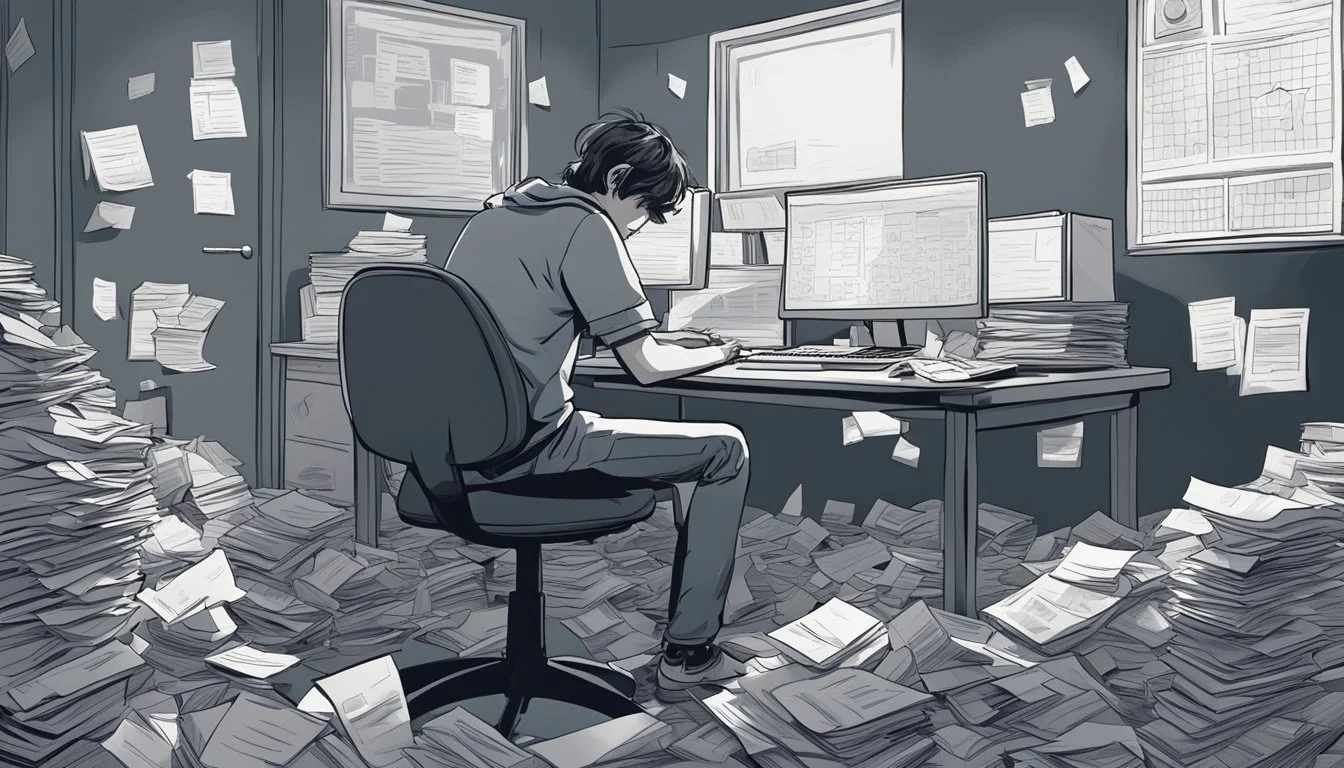Exploring Narcissistic Collapse and Psychosis Through Online Communities
Narcissistic collapse is a psychological phenomenon that can occur in individuals with narcissistic personality disorder (NPD). It involves a profound breakdown of their grandiose self-image, often triggered by perceived failures or rejections. During a narcissistic collapse, a person may experience intense feelings of shame, emptiness, and despair, leading to erratic behavior and even thoughts of self-harm.
On Reddit, many individuals share their experiences with narcissistic collapse, offering insights into this challenging mental state. Some describe feeling overwhelmed by their manipulative tendencies and the damage they've caused to others. Others express a sense of hopelessness and isolation, struggling to maintain relationships or function in daily life.
While narcissistic collapse can be extremely distressing, it's important to note that recovery is possible. Some Reddit users report success in managing their symptoms through therapy, self-reflection, and developing healthier coping mechanisms. These accounts highlight the importance of seeking professional help and support during times of crisis.
Understanding Narcissistic Personality Disorder
Narcissistic Personality Disorder (NPD) is a complex mental health condition characterized by an inflated sense of self-importance and a deep need for excessive attention and admiration. It involves a pattern of grandiosity, lack of empathy, and hypersensitivity to criticism.
Defining NPD
Narcissistic Personality Disorder is a mental health condition in which individuals have an exaggerated sense of their own importance and a deep need for admiration. People with NPD often believe they are superior to others and have little regard for other people's feelings.
Key traits of NPD include:
Grandiose sense of self-importance
Preoccupation with fantasies of unlimited success, power, or beauty
Belief in one's own uniqueness
Need for constant admiration
Sense of entitlement
NPD can significantly impact personal relationships and professional life. Individuals with this disorder may struggle to maintain healthy connections due to their lack of empathy and tendency to exploit others for personal gain.
Significance of Narcissistic Supply
Narcissistic supply refers to the attention, admiration, and recognition that individuals with NPD crave and rely on to maintain their self-esteem. This supply is essential for their psychological well-being and sense of self-worth.
Sources of narcissistic supply can include:
Praise and compliments
Public recognition or awards
Social media attention
Achievements or successes
When narcissistic supply is threatened or cut off, individuals with NPD may experience intense distress or anger. This can lead to manipulative behaviors or aggressive outbursts as they attempt to regain the admiration they depend on.
Grandiosity and Vulnerability
Grandiosity and vulnerability are two key aspects of NPD that often coexist, creating a complex and sometimes contradictory presentation.
Grandiosity in NPD manifests as:
Exaggerated self-importance
Belief in one's superiority
Expectation of special treatment
Vulnerability, on the other hand, appears as:
Fragile self-esteem
Hypersensitivity to criticism
Fear of rejection or failure
This combination can lead to fluctuating behaviors and emotions. A person with NPD may appear confident and boastful one moment, then become defensive or withdrawn when faced with perceived criticism or failure.
Symptoms and Signs of Narcissistic Collapse
Narcissistic collapse involves a range of behavioral and emotional changes as the narcissist's inflated self-image crumbles. These symptoms can manifest suddenly and intensely, often triggered by perceived threats to their ego or self-worth.
Identifying the Triggers
Criticism or rejection often spark narcissistic collapse. Major life changes like job loss or relationship breakups can destabilize a narcissist's sense of superiority. Public embarrassment or failure may shatter their carefully crafted image.
Perceived attacks on their competence or authority frequently trigger collapse. Aging and loss of youthful looks or abilities can be particularly devastating. Competition or being outperformed by others may also lead to breakdown.
Behavioral Changes
During collapse, a narcissist's behavior often becomes erratic and volatile. They may lash out with angry outbursts or narcissistic rage. Vindictive behaviors aimed at perceived enemies are common.
Withdrawal from social interactions is typical as they struggle to maintain their facade. Some become clingy and desperate for validation and reassurance. Others display increased aggression, both verbal and physical.
Defensive behaviors intensify as they try to protect their fragile ego. This may include:
Excessive bragging
Blaming others
Making excuses
Gaslighting
Emotional Impact
Emotionally, narcissistic collapse is marked by extreme vulnerability and fragility. Intense anxiety and panic attacks are common as their sense of self-worth crumbles. Many experience deep feelings of shame, humiliation, and worthlessness.
Irritability and mood swings are frequent as they struggle to regulate emotions. Some sink into depression or experience suicidal thoughts. Paranoia may develop as they feel under constant threat.
Narcissists often cycle through rage, self-pity, and emptiness during collapse. Their usual grandiosity gives way to insecurity and fear of abandonment. This emotional instability can persist for extended periods.
Psychological Effects of Narcissistic Collapse
Narcissistic collapse can have profound psychological impacts. The breakdown of one's grandiose self-image often leads to intense emotional distress and instability.
Shame and Anxiety
Shame becomes overwhelming during narcissistic collapse. The individual's carefully constructed facade crumbles, exposing perceived flaws and inadequacies. This can trigger extreme anxiety and panic attacks.
Feelings of exposure and vulnerability intensify. The narcissist may become hypersensitive to criticism, real or imagined. Social situations that were once navigated with ease now feel threatening.
Anxiety may manifest physically through symptoms like rapid heartbeat, sweating, and trembling. Some individuals experience dissociation or depersonalization as defense mechanisms against intense shame.
Depression and Suicidality
Deep depression often follows narcissistic collapse. The loss of an idealized self-image can feel devastating. Individuals may struggle with feelings of emptiness, hopelessness, and despair.
In severe cases, suicidal thoughts or behaviors may emerge. The pain of facing a fractured sense of self can seem unbearable. Professional help is crucial during this fragile period.
Shame-based depression is common. The individual may fixate on perceived failures and shortcomings. Negative self-talk and rumination can worsen depressive symptoms.
Impact on Self-Esteem
Narcissistic collapse shatters self-esteem. The inflated sense of self-worth gives way to intense self-doubt and insecurity. Individuals may feel worthless without their grandiose persona.
Rebuilding a stable self-image becomes challenging. The narcissist must confront the discrepancy between their idealized and actual self. This process often involves grief and identity confusion.
Low self-esteem can impact all areas of life. Work performance may suffer. Relationships may become strained as the individual struggles with vulnerability and authenticity.
Coping and Management Strategies
Navigating narcissistic collapse psychosis requires a multifaceted approach. Key strategies focus on therapeutic interventions, building a robust support network, and fostering self-awareness.
Therapeutic Approaches
Psychotherapy plays a crucial role in managing narcissistic collapse psychosis. Cognitive-behavioral therapy (CBT) helps individuals identify and challenge distorted thought patterns. Dialectical behavior therapy (DBT) teaches skills for emotional regulation and interpersonal effectiveness.
Group therapy provides a safe space to practice social interactions and receive peer feedback. Trauma-focused therapies may be beneficial for addressing underlying issues contributing to narcissistic traits.
Regular therapy sessions allow for ongoing support and skill development. Therapists can help clients set realistic goals and develop healthier coping mechanisms.
Building a Support System
A strong support system is essential for recovery. Trusted friends and family members can offer emotional support and reality checks during difficult times.
Support groups for individuals with narcissistic traits or personality disorders provide valuable peer connections. Online forums and communities, like those on Reddit, can offer additional support and shared experiences.
Professional support from psychiatrists or mental health nurses may be necessary, especially during acute phases of collapse. Establishing a crisis plan with key contacts can provide a safety net during emergencies.
Developing Self-Insight
Cultivating self-awareness is crucial for managing narcissistic collapse psychosis. Journaling can help track emotional patterns and triggers. Mindfulness practices promote present-moment awareness and reduce reactivity.
Reading about narcissism and personality disorders can increase understanding of one's condition. Self-reflection exercises, guided by a therapist, can uncover core beliefs and values.
Developing empathy through perspective-taking exercises can improve interpersonal relationships. Learning to recognize and manage emotional reactions helps prevent further crises.
Practicing self-compassion techniques can boost self-esteem without relying on external validation. Setting realistic goals and celebrating small achievements fosters genuine self-confidence.
Interpersonal Dynamics and Relationships
Narcissistic collapse profoundly impacts social interactions and personal connections. Individuals experiencing this state often exhibit extreme behaviors that strain their relationships and communication with others.
Manipulation and Control Tactics
During narcissistic collapse, individuals may intensify their efforts to maintain control over others. They often employ guilt-tripping, emotional blackmail, or gaslighting to manipulate those around them.
Silent treatment becomes a common tactic, used to punish perceived slights or assert dominance. This can leave partners, friends, or family members feeling confused and isolated.
Devaluing others is another frequent strategy. The person may suddenly criticize or belittle those they previously idealized, attempting to boost their own fragile self-esteem.
Dealing with Rejection and Criticism
Rejection and criticism can be particularly devastating during narcissistic collapse. These experiences often trigger intense emotional reactions, including narcissistic rage.
Individuals may lash out verbally or physically when faced with perceived rejection. They struggle to process negative feedback constructively, instead viewing it as a personal attack.
Ghosting becomes a common defense mechanism. When feeling criticized or rejected, they may abruptly cut off contact with others to avoid further emotional pain.
Effects on Close Relationships
Narcissistic collapse places immense strain on intimate relationships and friendships. Partners often report feeling emotionally drained and walking on eggshells to avoid triggering outbursts.
The constant need for external validation can overwhelm those close to the individual. Friends and family may feel pressured to provide constant reassurance and support.
Trust issues frequently arise as manipulation tactics come to light. This can lead to the breakdown of long-standing relationships and social isolation for the person experiencing collapse.
Types of Narcissistic Personalities
Narcissistic personalities come in different forms, each with distinct traits and behaviors. These variations can impact how narcissistic collapse manifests and progresses.
Exhibitionist Narcissists
Exhibitionist narcissists crave attention and admiration. They often dominate conversations and social situations. These individuals frequently boast about their accomplishments and abilities.
Exhibitionist narcissists may:
Dress provocatively or flamboyantly
Engage in dramatic behaviors to attract focus
Become angry when not the center of attention
They thrive on praise and validation from others. During narcissistic collapse, exhibitionist narcissists might experience intense shame and withdrawal from social interactions.
Grandiose Narcissists
Grandiose narcissists possess an inflated sense of self-importance. They believe they are superior to others and deserve special treatment. These individuals often have unrealistic fantasies of success, power, or brilliance.
Key traits of grandiose narcissists include:
Exaggerating achievements and talents
Expecting constant praise and admiration
Taking advantage of others to achieve their goals
When faced with failure or criticism, grandiose narcissists may experience severe emotional distress. This can lead to aggressive outbursts or complete emotional shutdown.
Defensive Grandiosity
Defensive grandiosity is a coping mechanism used by some narcissists. These individuals present a facade of superiority to mask deep-seated insecurities and feelings of inadequacy.
Narcissists exhibiting defensive grandiosity may:
React strongly to perceived slights or criticism
Devalue others to maintain their self-image
Struggle with intimacy and vulnerability
During narcissistic collapse, those with defensive grandiosity often experience intense anxiety and depression. They may alternate between periods of inflated self-worth and crushing self-doubt.
Long-Term Outlook and Recovery
Recovery from narcissistic collapse psychosis involves potential for change but also significant challenges. The path forward requires sustained effort and professional support to address underlying issues and develop healthier coping mechanisms.
Potential for Change and Growth
Individuals experiencing narcissistic collapse can achieve meaningful growth with proper treatment. Therapy helps build self-awareness and emotional regulation skills. Many learn to form more authentic relationships and develop genuine self-esteem.
Some find mindfulness practices beneficial for managing intense emotions. Group therapy allows for peer support and perspective-sharing. Developing empathy often leads to improved social connections.
Success stories on Reddit forums highlight the possibility of profound personal transformation. However, change requires commitment and can be a gradual process spanning months or years.
Challenges in Treatment
Engaging narcissistic individuals in therapy can be difficult due to their tendency to avoid vulnerability. Resistance to acknowledging personal flaws may hinder progress. Trust issues can interfere with the therapeutic alliance.
Treatment dropout rates tend to be high. Suicidal ideation and self-harm risks necessitate close monitoring during recovery. Comorbid conditions like depression or substance abuse often require concurrent treatment.
Relapses into old patterns are common, especially during stressful periods. Ongoing support is crucial for maintaining gains. Family involvement can aid recovery but may also present complications if dysfunctional dynamics persist.







